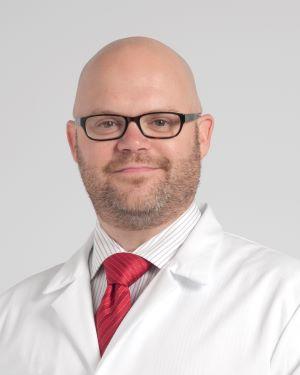Research News
04/18/2024
Study finds potential therapeutic target for pulmonary fibrosis scarring
Cleveland Clinic study unveils mechanisms underlying fibrosis progression and promising treatment avenue.

Cleveland Clinic researchers have identified the protein S100A4 as a potential therapeutic target for treatment of idiopathic pulmonary fibrosis, IPF, a debilitating and progressive scarring disorder in the lungs.
The research clarifies mechanisms underlying IPF and offers hope for a treatment to halt the disease's devastating effects. The disease progressively impairs the lungs until they are no longer able to function. Investigators reversed lung stiffness in preclinical models by inhibiting the protein S100A4 in fibroblasts, which shape our connective tissues. The results were published in the Journal of Biological Chemistry.
"This is a new bend in the road for our team's research," says senior author Brian Southern, MD, associate staff in the Lerner Research Institute and a staff physician in the Cleveland Clinic Respiratory Institute. "There are no known cures for IPF, and current treatments are not very effective, so finding new targets like this protein to slow down or halt the progression of fibrosis is extremely important in translating our research into new treatments and therapies."
Dr. Southern's team investigates cell proteins that respond to environmental cues in the lungs, like stiffness. In a previously published paper, investigators showed the motor protein non-muscle myosin II rearranged itself within the cell depending on the stiffness it encounters. Myosin II is a molecular motor inside the cell that when arranged in filaments can be involved in cell migration or in changing fibroblasts into myofibroblasts. After examining the proteins that regulate myosin II, Dr. Southern's team zeroed in on S100A4, which unravels myosin filaments and allows them to move around the cell.
Under conditions of increased stiffness like IPF, S100A4 unravels myosin filaments and allows them to form thick central stress fibers. The team showed this rearrangement leads to the lung developing myofibroblasts, cells that produce scar tissue.
The findings indicate that S100A4 expression is dysregulated in IPF through showing S100A4 absence protects against IPF in preclinical models.
IPF and other scarring and fibrotic disorders can also affect additional organs such as the heart, liver and kidney. The Southern team's research is a foundation for developing innovative therapeutic approaches. By targeting S100A4 and its regulatory factors, they aim to intervene in the fibrotic process and ultimately improve outcomes for patients with fibrotic diseases.
Featured Experts
News Category
Related News
Research areas
Want To Support Ground-Breaking Research at Cleveland Clinic?
Discover how you can help Cleveland Clinic save lives and continue to lead the transformation of healthcare.
Give to Cleveland Clinic